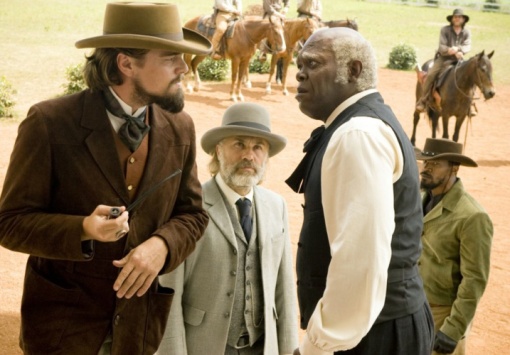 Quentin Tarantino’s name is now a brand, one with hallmarks of dialogue and style widely recognized by all cinephiles. It’s an accomplishment achieved not only by Tarantino’s incredible virtuosity but also by the scores of cheap rip-offs who have solidified his status as a major figure in film history. Yet with “Django Unchained,” Tarantino proves that the greatest of all these impersonators is Tarantino himself.
Quentin Tarantino’s name is now a brand, one with hallmarks of dialogue and style widely recognized by all cinephiles. It’s an accomplishment achieved not only by Tarantino’s incredible virtuosity but also by the scores of cheap rip-offs who have solidified his status as a major figure in film history. Yet with “Django Unchained,” Tarantino proves that the greatest of all these impersonators is Tarantino himself.
The experience is not unlike that of watching “Jackie Brown,” the only other film of the Tarantino canon that “Django Unchained” manages to stand next to in quality. Both films followed major artistic breakthroughs for him that scored with audiences and critics alike, “Pulp Fiction” and “Inglourious Basterds.”
But rather than use the forward momentum to lead to further exploration of his craft, Tarantino chose to take a victory lap fueled by the high of inhaling too much of the exhaust fumes of his own success. ”Django Unchained” just feels like Tarantino on autopilot, lacking the vibrancy or surprising eccentricity of his prior films. There are plenty of laughs to be had, sure, but it just feels like far too much of the same stylized dialogue and aestheticized violence; popping in the DVD of “Reservoir Dogs” would probably yield more satisfaction.

It is also probably no coincidence that ”Django Unchained,” like “Jackie Brown,” is a cloying and desperate attempt by Tarantino to get the African-American community to accept him as one of their own. He even seems so convinced the movie will win over black audiences that he even tosses out the N-word at the frequency Scorsese drops the F-bomb. As if a gushing ode to tough-as-nails blaxploitation icon Pam Grier wasn’t enough, he has now concocted a tale of slave vengeance with Jamie Foxx’s sharp-shooting badass named Django (the D is silent, he would have you know) leading the charge against the cartoonish white oppressors. Oh, and not to mention one particularly pernicious Uncle Tom played by the inimitable Samuel L. Jackson.
There’s definitely something interesting that could have been said through Leonardo DiCaprio’s Calvin Candie, but Tarantino employs him mainly for comedy or a mouthpiece to spew the racial hatred the movie lashes out against. DiCaprio owns the character, particularly in one scene where he turns almost demonic in his vehement assertion of biological determinism, yet the vast inferiority to Hans Landa as a villain feels exacerbated since Tarantino molds the two from practically the same cloth.
For that matter, he also only makes minor variations to the character for Christoph Waltz’s King Schultz, a bounty hunter who enlists and abets Django’s quest for bloodlust. Schultz speaks and carries himself exactly like Landa, just with shades of grey. However, the fault for the similarity could be equally distributed between Tarantino’s cookie-cutter writing and Waltz’s uninspired performance.
Tarantino hinted at some serious intellectual depth in “Inglourious Basterds,” yet it remains unfulfilled in “Django Unchained.” If there’s some sort of political statement here, it’s either muddled or far too simplistic. Whatever lies there is also hidden under oceans of blood that harken back to the “Kill Bill” films, Tarantino’s saga of revenge and carnage that feels like the closest blood relative of “Django Unchained.” The two also share in common that they value style over substance, although in this case, Tarantino splices and pastiches one too many genres. The result is a rather mixed bag of fun and frustration.
However, neither “Kill Bill” nor “Jackie Brown” suffered from as much of the stilted storytelling that weighs down “Django Unchained.” The film might have benefitted from being broken into two parts a la “Kill Bill” as the first hour has an almost entirely separate story arc, which might have felt like more than tedious exposition if given the chance to breathe and have a miniature climax of its own. Because as is, “Django Unchained” doesn’t really seem to start until about a third of the way in. If you want to say it even starts at all. C+ / 
